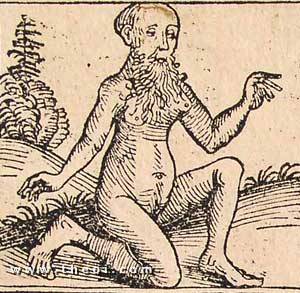MACHLYES (Makhlyes) - Hermaphrodite Libyan Tribe of Greek Legend (original) (raw)
Greek Mythology >> Bestiary >> Legendary Tribes >> Machlyes (Makhlyes)
Translation
Lewd, Lustful?

Androgyne from the Nuremburg Chronicle (1493)
THE MAKHLYES (Machlyes) were Libyan tribe of hermaphrodites or androgynes whose bodies were male on one side and female on the other.
The historical tribe known as the Makhlyes inhabited the region about Lake Tritonis in north-west Libya. The warlike practices of the young women and long-hair of the men probably gave rise to the legend of androgyny.
The name perhaps derives from the Greek words makhlês and makhlos meaning "lewd" or "lustful".
CLASSICAL LITERATURE QUOTES
Herodotus, Histories 4. 180. 1 (trans. Godley) (Greek historian C5th B.C.) :
"[On the tribes of Libya :] Next to the Makhlyes (Machlyes) are the Auseans; these and the Makhlyes, separated by the Triton, live on the shores of Lake Tritonis. The Makhlyes wear their hair long behind, the Auseans in front. They celebrate a yearly festival of Athena, where their maidens are separated into two bands and fight each other with stones and sticks, thus, they say, honoring in the way of their ancestors that native goddess whom we call Athena. Maidens who die of their wounds are called false virgins. Before the girls are set fighting, the whole people choose the fairest maid, and arm her with a Korinthian (Corinthian) helmet and Greek panoply, to be then mounted on a chariot and drawn all along the lake shore. With what armor they equipped their maidens before Greeks came to live near them, I cannot say; but I suppose the armor was Egyptian; for I maintain that the Greeks took their shield and helmet from Egypt."
Pliny the Elder, Natural History 7. 15 (trans. Rackham) (Roman encyclopedia C1st A.D.) :
"Beyond the Nasamones [of Libya] and adjacent to them Calliphanes records the Machlyes, who are androgynous and perform the function of either sex alternatively. Aristotle [Greek philosopher C4th B.C.] adds that their left breast is that of a man and their right breast that of a woman."
SOURCES
GREEK
- Herodotus, Histories - Greek History C5th B.C.
ROMAN
- Pliny the Elder, Natural History - Latin Encyclopedia C1st A.D.
BIBLIOGRAPHY
A complete bibliography of the translations quoted on this page.